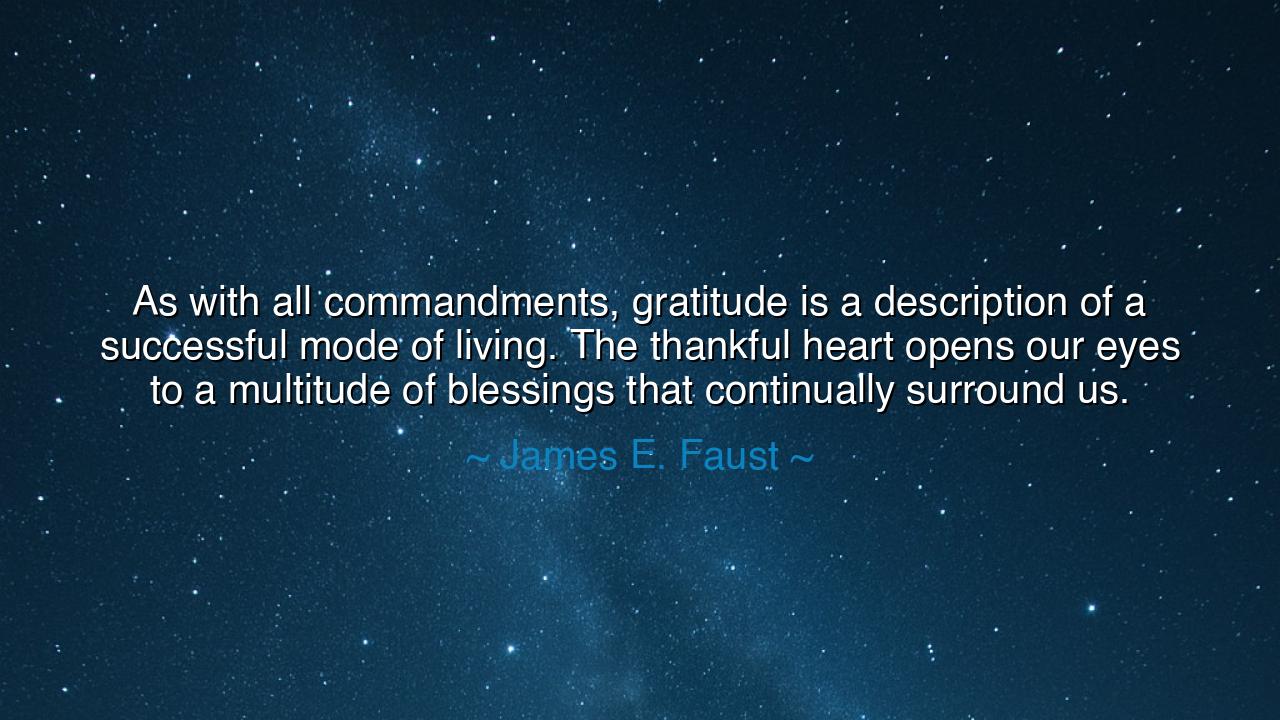
As with all commandments, gratitude is a description of a
As with all commandments, gratitude is a description of a successful mode of living. The thankful heart opens our eyes to a multitude of blessings that continually surround us.






Hear the words of James E. Faust, a man who spoke with the cadence of eternal truth: “As with all commandments, gratitude is a description of a successful mode of living. The thankful heart opens our eyes to a multitude of blessings that continually surround us.” In this teaching, he does not present gratitude merely as courtesy or ornament, but as commandment—an unshakable law of life, a sacred way of being that leads to strength, peace, and abundance.
The first jewel in his words is the recognition that gratitude is a commandment. To treat it lightly, as though it were optional, is to misunderstand its power. Just as commandments guard the soul against destruction and guide the spirit toward light, so too does gratitude preserve the heart from envy, despair, and blindness. To live without gratitude is to stumble in darkness; to live with it is to walk in the path of wisdom. Gratitude is not only virtue—it is survival.
The second flame is the image of the thankful heart. A heart filled with gratitude is not heavy but light, not clouded but clear. It is open, tender, and capable of seeing beyond its own pain. Where the ungrateful heart sees only lack, the thankful heart perceives blessings hidden in plain sight: the warmth of sunlight, the strength of a friend’s hand, the lessons learned even in failure. Such a heart transforms the world, for it sees abundance where others see scarcity.
The third truth in Faust’s saying is the claim that gratitude is a successful mode of living. Success is often defined by riches, fame, or conquest. Yet Faust turns this definition upside down. True success is not in accumulation, but in recognition; not in what is acquired, but in how one perceives what is already present. The successful life is the life that can look upon even small mercies with reverence, that can rejoice in simple gifts, that can find joy not tomorrow, but today.
History gives us a mirror in the story of Viktor Frankl, survivor of the Nazi death camps. Surrounded by unimaginable suffering, Frankl discovered that even in the harshest conditions, man can choose his state of mind. He gave thanks for small things—a shared crust of bread, a glimpse of the sky, the memory of love. It was this thankful heart that allowed him to endure, and later to teach the world that meaning and gratitude can be found even in suffering. His life testifies to Faust’s wisdom: gratitude opens our eyes to blessings, even in the darkest places.
The fourth jewel is the multitude of blessings that surround us. Faust reminds us that life is rich beyond measure, not because we own much, but because we are given much—often without noticing. The air we breathe, the ground we walk, the relationships that hold us, the opportunities to grow—all these are blessings, hidden to the blind but revealed to the grateful. Gratitude is the lens that reveals abundance in every corner of existence.
The lesson is clear: cultivate a thankful heart. See gratitude not as an occasional practice, but as a daily commandment, a way of life that opens the eyes and frees the spirit. Without gratitude, even wealth is poverty; with it, even hardship becomes treasure. To live thankfully is to live wisely, richly, and well.
Practically, this means beginning each day by naming aloud the blessings that surround you. It means pausing, even in trial, to give thanks for what remains, and choosing to interpret your life not by what is lacking, but by what has been bestowed. In doing this, you will live the commandment Faust described: the successful mode of living that springs from a grateful heart.
Thus, his words echo like sacred fire: gratitude is not merely courtesy; it is commandment, it is clarity, it is success itself. And the one who cultivates a thankful heart will never walk in blindness, but will see blessings unfolding everywhere.






AAdministratorAdministrator
Welcome, honored guests. Please leave a comment, we will respond soon